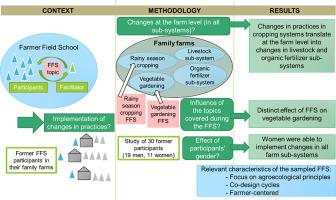Agricultural Systems ( IF 6.6 ) Pub Date : 2022-07-14 , DOI: 10.1016/j.agsy.2022.103457 Teatske Bakker , Patrick Dugué , Stéphane de Tourdonnet

|
CONTEXT
Farmers are increasingly recognized as the designers of their own production systems, and face challenges that call for context-specific innovations. Co-designing innovations with farmers is one way to tailor options to local constraints and resources. However, studies on how farmers implement agroecological practices after a co-design process are rare, especially at the farm level.
OBJECTIVE
This study analyses how farmers' implementation of technical innovations co-designed during Farmer Field Schools (FFS), an adult education and rural development approach, brings farmers to change their practices at the farm level. We also explore whether the potential to induce changes at the farm level varies with the cropping system targeted by the FFS or with the gender of participants.
METHODS
To study the outcomes at the farm level of the co-design process in FFS, we established an analytical framework based on four sub-systems identified within family farming systems in the cotton growing area in West Africa: vegetable gardening, rainy season cropping, livestock management and organic fertilizer production. We applied the framework to a case study in northern Togo on FFS promoting the agroecological transition of family farms. Four FFS were sampled; three covered two different cropping systems (vegetable gardening and rainy season crops) in separate sessions while the fourth FFS only covered vegetable gardening. Semi-structured interviews were conducted with 30 farmers (19 men, 11 women) all former participants in either vegetable gardening FFS (n = 8), rainy season cropping FFS (n = 10) or both (n = 12). The interviews took place two years after the end of FFS activities and covered changes in practices in the four farm sub-systems identified.
RESULTS AND CONCLUSIONS
Our results show that the changes in practices were not limited to the cropping system addressed during the FFS attended by each farmer. Participation in the FFS triggered changes in practices at the farm level in livestock systems and organic fertilizer production among the farmers we surveyed. The vegetable gardening FFS had a distinct effect on the development of vegetable gardening activities, but the effects of the rainy season crop FFS were less specific. Farmers who attended both FFS did not change more practices than farmers who attended only one FFS. The gender of the participants did not lead to more, less, or different changes in farm practices.
SIGNIFICANCE
Our framework reveals the systemic nature of the changes in practices in family farms. This was made possible by the collaborative implementation of the sampled FFS and the agroecological principles covered in the FFS curricula. This study provides insights for the implementation of co-design processes to support farmers in their processes of change in practices and redesign of their farming systems, which are crucial to agroecological transitions.
中文翻译:

在农民田间学校的共同设计流程之后,农民如何改变他们在农场层面的做法?
语境
农民越来越被认为是他们自己生产系统的设计者,并面临着需要针对具体情况进行创新的挑战。与农民共同设计创新是根据当地限制和资源定制选项的一种方式。然而,关于农民如何在共同设计过程后实施生态农业实践的研究很少,尤其是在农场层面。
客观的
本研究分析了农民在农民田间学校 (FFS)(一种成人教育和农村发展方法)期间共同设计的技术创新的实施如何使农民在农场层面改变他们的做法。我们还探讨了在农场层面引发变化的潜力是否因 FFS 所针对的种植系统或参与者的性别而异。
方法
为了研究 FFS 中协同设计过程在农场层面的结果,我们基于在西非棉花种植区的家庭农业系统中确定的四个子系统建立了一个分析框架:蔬菜园艺、雨季种植、牲畜管理和有机肥生产。我们将该框架应用于多哥北部关于 FFS 促进家庭农场农业生态转型的案例研究。采样了四个 FFS;第三个在不同的会议上涵盖了两种不同的种植系统(蔬菜园艺和雨季作物),而第四个 FFS 仅涵盖了蔬菜园艺。对 30 名农民(19 名男性,11 名女性)进行了半结构化访谈,所有农民均曾参加过蔬菜种植 FFS(n = 8)、雨季种植 FFS(n = 10) 或两者兼有 ( n = 12)。访谈是在 FFS 活动结束两年后进行的,涵盖了确定的四个农场子系统的实践变化。
结果和结论
我们的结果表明,实践的变化不仅限于每个农民参加的 FFS 期间解决的种植系统。参与 FFS 在我们调查的农民中引发了农场一级畜牧系统和有机肥生产实践的变化。蔬菜园艺 FFS 对蔬菜园艺活动的发展有明显的影响,但雨季作物 FFS 的影响不太具体。参加两次 FFS 的农民并没有比只参加一次 FFS 的农民改变更多的做法。参与者的性别并没有导致农场实践发生更多、更少或不同的变化。
意义
我们的框架揭示了家庭农场实践变化的系统性。这是通过合作实施抽样的 FFS 和 FFS 课程中涵盖的农业生态原则而实现的。本研究为实施协同设计过程提供了见解,以支持农民改变做法和重新设计其农业系统的过程,这对农业生态转型至关重要。



























 京公网安备 11010802027423号
京公网安备 11010802027423号